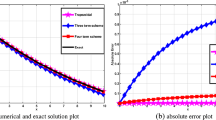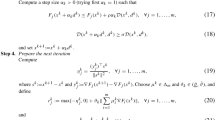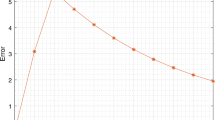Abstract
This work concerns the numerical solution of high-dimensional systems of nonlinear equations, when derivatives are not available for use, but assuming that all functions defining the problem are continuously differentiable. A hybrid approach is taken, based on a derivative-free iterative method, organized in two phases. The first phase is defined by derivative-free versions of a fixed-point method that employs spectral parameters to define the steplength along the residual direction. The second phase consists on a matrix-free inexact Newton method that employs the Generalized Minimal Residual algorithm to solve the linear system that computes the search direction. This second phase will only take place if the first one fails to find a better point after a predefined number of reductions in the step size. In all stages, the criterion to accept a new point considers a nonmonotone decrease condition upon a merit function. Convergence results are established and the numerical performance is assessed through experiments in a set of problems collected from the literature. Both the theoretical and the experimental analysis support the feasibility of the proposed hybrid strategy.




Similar content being viewed by others
References
Armijo, L.: Minimization of functions having Lipschitz continuous first partial derivatives. Pac. J. Math. 16, 1–3 (1966)
Barzilai, J., Borwein, J.M.: Two-point step size gradient methods. IMA J. Numer. Anal. 8, 141–148 (1988)
Chamberlain, R.M., Powell, M.J.D., Lemarechal, C., Pedersen, H.C.: The watchdog technique for forcing convergence in algorithms for constrained optimization. In: Buckley, A.G., Goffin, J.L. (eds.) Algorithms for Constrained Minimization of Smooth Nonlinear Functions. Mathematical Programming Studies, vol. 16, pp. 1–17. Springer, Berlin (1982)
Dembo, R.S., Eisenstat, S.C., Steihaug, T.: Inexact Newton methods. SIAM J. Numer. Anal. 19, 400–408 (1982)
Dolan, E.D., Moré, J.J.: Benchmarking optimization software with performance profiles. Math. Program. 91, 201–213 (2002)
Eisenstat, S.C., Walker, H.F.: Choosing the forcing terms in an inexact-Newton method. SIAM J. Sci. Comput. 17, 16–32 (1996)
Grippo, L., Lampariello, F., Lucidi, S.: A nonmonotone line search technique for Newton’s method. SIAM J. Numer. Anal. 23, 707–716 (1986)
Grippo, L., Sciandrone, M.: Nonmonotone derivative-free methods for nonlinear equations. Comput. Optim. Appl. 37, 297–328 (2007)
Grippo, L., Sciandrone, M.: Nonmonotone globalization of the finite-difference Newton-GMRES method for nonlinear equations. Optim. Methods Softw. 25, 971–999 (2010)
Kelley, C.T.: Iterative Methods for Linear and Nonlinear Equations. SIAM, Philadelphia (1995)
La Cruz, W., Martínez, J.M., Raydan, M.: Spectral residual method without gradient information for solving large-scale nonlinear systems of equations. Math. Comput. 75, 1429–1448 (2006)
La Cruz, W., Raydan, M.: Nonmonotone spectral methods for large-scale nonlinear systems. Optim. Methods Softw. 18, 583–599 (2003)
Li, D.H., Fukushima, M.: A derivative-free line search and global convergence of Broyden-like method for nonlinear equations. Optim. Methods Softw. 13, 181–201 (2000)
Lukšan, L., Vlček, J.: Sparse and partially separable test problems for unconstrained and equality constrained optimization. Report V-767, ICS AS CR, Prague (1998)
Saad, Y., Schultz, M.H.: GMRES: a generalized minimal residual algorithm for solving nonsymmetric linear systems. SIAM J. Sci. Stat. Comput. 7, 856–869 (1986)
Acknowledgements
We are thankful to Sandra Augusta Santos, from University of Campinas, Brazil, for suggestions and valuable discussions on the subject, which greatly helped us to improve the paper. We also acknowledge the suggestions of two anonymous referees, which greatly contributed for the paper organization.
Author information
Authors and Affiliations
Corresponding author
Additional information
Publisher's Note
Springer Nature remains neutral with regard to jurisdictional claims in published maps and institutional affiliations.
Ana L. Custódio: Support for this author was provided by Fundação para a Ciência e a Tecnologia (Portuguese Foundation for Science and Technology) under the projects PTDC/MAT-APL/28400/2017 and UID/MAT/00297/2019. Márcia A. Gomes-Ruggiero: Partially supported by PRONEX-Optimization; CNPq (Grants 306220/2009-1 and 309733/2013-8); FAPESP (Grants 2013/05475-7 and 2013/07375-0) and CAPES.
Rights and permissions
About this article
Cite this article
Begiato, R.G., Custódio, A.L. & Gomes-Ruggiero, M.A. A global hybrid derivative-free method for high-dimensional systems of nonlinear equations. Comput Optim Appl 75, 93–112 (2020). https://doi.org/10.1007/s10589-019-00149-y
Received:
Published:
Issue Date:
DOI: https://doi.org/10.1007/s10589-019-00149-y




